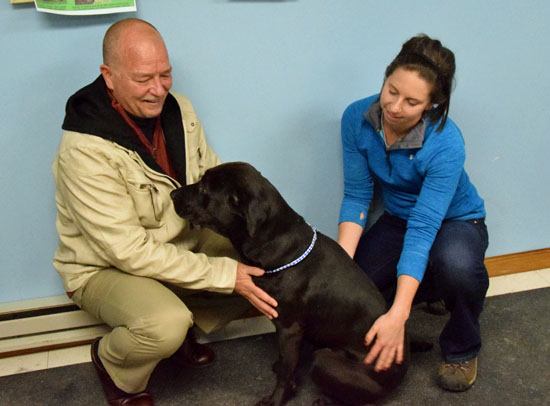Animal shelter overcomes challenges
DAVE MOSIER/independent editor
The Van Wert County Humane Society Shelter wasn’t always viewed in a positive light. In fact, the past year has been a series of challenges for a new Humane Society board that has taken real ownership of a facility that has been the site of mistreatment of animals in the past under former county dog warden Rich Strunkenburg.

Pete Weir, current Humane Society board president, said that, prior to the current board, the Humane Society wasn’t really involved much in the operation of the shelter, which the county was using mostly as a dog pound, where dogs that were brought in were often euthanized.
Today, the Humane Society is involved in every aspect of the shelter, with hundreds of volunteer hours logged to ensure the shelter is just that: a shelter.
“This board right now is treating this shelter as a shelter; it’s not a dog pound where dogs come in and never come out,” Weir said. “We pride ourselves on being as much of a non-kill shelter as we can.”
One of the keys to the turnaround is the current board, whose members put in hundreds of volunteer hours a month to make sure the shelter is well run.
Weir said the challenges were daunting when the new board was formed following the Van Wert County Board of Commissioners’ firing of Strunkenburg in August 2014.
“The sewer lines were plugged up and there wasn’t any water pressure, there wasn’t a washer and dryer … we didn’t have anything,” Weir said of the facility challenges.
In addition to shelter infrastructure issues, the house on the property had to be totally gutted, with new windows and doors installed as the board transitioned the house into a rental property that now brings in revenue to help operate the shelter.
One of the keys to the shelter’s improved operation has been the volunteer program the new board has implemented under board member Sarah Robeson, who heads the Humane Society board’s Volunteer Committee.
Robeson, who has dogs of her own, said she first became involved in the shelter because she was interested in walking the dogs that were brought in.
“I just kind of crow-barred my way in here,” she said with a smile, while adding that heading up the volunteer program was a new experience for her.
“It’s been difficult; it’s been more about working with people (than animals),” Robeson noted.
New procedures and training programs are now in place for the approximately 75 volunteers who clean the facility, walk and socialize with the dogs and act as an additional set of eyes to help maintain the health of the shelter’s animals. Volunteers also include local veterinarians who provide care for shelter animals.
Meanwhile, working with Deputy Sergeant Jeff May, the new county dog warden, has been a great experience, Weir said.
“This dog warden just goes above and beyond expectations,” he noted.
Weir said the public’s perception of the shelter has also slowly changed, although that’s not always been a positive, since more and more animals are being left in the shelter’s outside kennels by owners no longer able to care for them.
Weir said he wished the owners would just come in and let shelter volunteers know about their animals.
“We can understand the reasons for you needing to relinquish your animal, but we need to know the history of the animal,” Weir said, noting that it would help if shelter personnel knew what shots an animal has had and other important information about the animals.
Weir said the biggest future challenge is to expand the shelter enough to provide a designated area for cats, which the shelter now houses in addition to dogs, as well as a quarantine area for sick animals, and an area where prospective owners could socialize with animals, and where animals could be trained.
What the Humane Society needs most right now, Weir said, is financial help. Weir has requested $6,000 apiece from city and county government to help pay a new shelter manager who allows the shelter to remain open longer during the week, while a request for funds has also been made with The Van Wert County Foundation to pay for a new waste disposal system at the shelter.
Public donations are also welcome, since the Humane Shelter receives none of the revenues from dog tag sales or fines levied against owners who don’t purchase tags.
POSTED: 12/01/15 at 7:56 am. FILED UNDER: News







